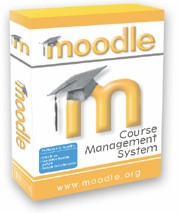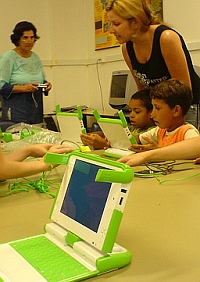I am Robert Arrowsmith and I've been on a journey of discovery with One Laptop Per Child. It's a journey that I'm enjoying, by the way. Each new morsel of Children's Machine XO knowledge that I discover is leading me on to more exciting discoveries.
Until today I had not explored the OLPC Wiki regarding deployment of One Server Per School to support operation of the XO laptops. In my mind one of the big gaps in the OLPC puzzle was how to implement teaching methodologies with a bunch of laptops. Did they expect that kids would turn on the XO and pearls of wisdom would spring forth? What was the teaching mechanism?
 The OLPC Wiki led me to Moodle since it was listed as an application to be installed in school servers. So being curious, I wanted to know more about Moodle. Martin Dougiamas would appear to be the instigator of Moodle with his well thought out writing on Constructivism thoughtfully linked through the Moodle-Buzz section of the Moodle website.
The OLPC Wiki led me to Moodle since it was listed as an application to be installed in school servers. So being curious, I wanted to know more about Moodle. Martin Dougiamas would appear to be the instigator of Moodle with his well thought out writing on Constructivism thoughtfully linked through the Moodle-Buzz section of the Moodle website.
It's certainly worth reading through all the comments posted by people at the end of the document about using Constructivism. I'd heard of Constructivism as it applies to OLPC initiatives but I'd not really invested time to really read about where its heading. Aside from mentions of Papert and his theories I was essentially in the dark.
After reading Martins 'Constructivism' paper I see how the theories might benefit education models for the future of education. I've also had a chance to find out about Moodle and I'm quite convinced in its ability to provide a framework for OLPC driven education models.
Moodle is a Course Management System using web technologies that we are now quite familiar with (Apache, MySQL, PHP). An Administrator would manage the system, Teachers provide 'Courses' that are built up easily using simple tools, Students progress through the Course material and are eventually graded by the Teachers. Even though the development was started back in November 2001, I was frankly surprised by the depth of the Moodle environment.
Many useful features have been integrated into the system with documentation management using Media Wiki and features like chat, blogging, calendar, forum and journal modules just make this a fantastic tool for teaching environments. The Moodle website has statistics for usage of Moodle. They list the number of known Moodle installations as 22,775. Over nine hundred thousand courses. One point four million teachers. More than 13 million enrollments. I'll let those figures sink in for a few seconds.... Then there's the part about site sizes.
There are 42 sites with more than 20000 users. The site with the most users is moodle.org with 43 courses and 208100 users. The site with the most courses is HSU Moodle with 12288 courses and 42121 users.I can see why OLPC would be considering Moodle as an important part of any OLPC server implementation in schools. Many of the features in Moodle complement the limited abilities of the XO laptop and give students the ability to store on the server a lot of documentation and information pertaining to school studies.
For those that have not yet grasped the role the diminutive XO laptop is playing in the roll-out of digital education it might be time to rethink things. With a school server and a wireless network students can sit under trees and complete those course modules. There are a number of teachers I want to show Moodle to so I've installed it here on my home server.
I guess that makes it 22,776 installations.



I'm sure Moodle if fine as far as it goes, but, as far as I can see it really caters better for subjects that can have a formal course structure. Arts and Humanities can be a bit more... chaotic, (but in a good way). Elgg could make a good unstructured counterpoint to Moodle's more structured approach.
One very important thing to note about Moodle is that it takes quite a lot of time and commitment (on the teacher's side) to keep courses running smoothly.
I see this from two sides as some of our university courses now rely on Moodle and another e-learning platform quite extensively. In the past year two courses have been handled very effectively via those platform while 4 others were quite appalling. So using Moodle can offer advantages to students but it very much depends on how it's handled.
On the other hand my father (who's a professor at a university of applied sciences) has recently started handling most of his courses via Moodle. I never knew how much time it takes to really manage such a course. He's certainly dedicating more of his (after-)work-hours to Moodle than he previously did in handling his courses "the old fashioned way".
How amazing it is when we are surprised that a teacher, investing effort as a student of a new educational method, might spend more time than the "old fashioned way".
This is true in every area of our lives! Do we not think that a mechanic spends more time when they start using new tools, or computers, to resolve problems? Of course they do!
The beauty here is that the teacher is becomming the student. And in some cases, working harder, for longer hours, we sometimes find ourselves more full of energy and engaged. The next step is to invite the student to take ownerhip of contributing to the teaching role. They have to learn to teach themselves, and others, too.
In fact, perhaps we should transcend the language of 'student' and 'teacher', and embody them into a single word, "learners". All learners have an obligation to help teach. Culture has relied on this concept forever.
Alternative challenge: What would prevent such a university from creating a course where the goal of the 'learners' in the course is to develop the material using this tool? We have got to blurr the distinction between student and teacher, and move to a co-learning environment. That does not imply that we lose discipline, or riggor. That does not mean that we lower our standards of the mastery of the subject matter. Perhaps the opposite is true. It is no longer ok to guess your way through a multiple choice quiz, you have to know your stuff!
Does this mean that 'learners' might have to put more effort into such a course? Of course it does! To think that learners in colleges today can't spot 'harder' courses from easier ones is pure folly.
The idea of creating the opportunity for a learner, anywhere in the world, to be able to seek out and learn; to be able to impart that passion on a co-learner and to pass to the next generation of learners their contributions is the cornerstone of how human kind has developed technology, art, literature... and everything else.
The ultimate educator's goal is to impart a passion for learning so fundamental that it enables people to form new areas of learning effort that live beyond our own lives.
There are so many paralells in this project. Eduction today is marketed, measured, paid for. In an underdeveloped country, a high school diploma means nothing. Enabeling an entire generation to be able to gain skill in farming, carpentry, sanitation, technology and medicine.... now that's education!
I had not heard of moodle, so now, I guess I have something to learn about today. I was wondering what it would be...
Ken, a very interesting comment indeed!
I'd recommend taking a look at Scholar360 http://www.scholar360.com It's inexpensive, easy-to-use, and it has social networking features that students love! (MySpace.com is an indication of how important social networking is to students.) You won't have spend near the start-up time that Moodle requires and training is quick because Scholar360's features are easier to use than, say, Blackboard or WebCT.
ChristophD: what you're really talking about is the time input needed to do web-based classes, not Moodle specifically. There's a common misconception that web-based classes should take less time. They don't. They take more. In some studies done on the subject, as much as three times more.
I'm not talking about the learning curve. Obviously, early on, any new system will take more time. Web-based courses just take more time. In my own experience, that's because of the increased student - teacher interaction. Steering forums and answering emails takes time! So even though after the initial setup, you can save lots of time because of things like automated quizzes and grade entry, you more than spend it talking to students.
Lots of us would say that's a big improvement!
Just a few comments from an old software develo[per.
The P in Moodle's LAMP is PHP. The P on XO laptops is Python. I think I know why. PHP (zend.com) and Mysql are both products of commercial companies.
I haven't counted lines of code, but I've instaled and studied Moodle. in my many years experience Moodle is a relativly small system. It has some ideas. But a new, much more extensive system (or set of smaller systems) needs to be imagined. 20,000 installs is tiny relative to a billion students of various needs.
Far more Open Source code is written with MySq and PHP than any other languages. For this project to work in the non-commercial way it intends all this code has to be ignored.
On the other hand I never would have though about your conclusion that online education takes longer because of more student teacher contact.
lanzdale